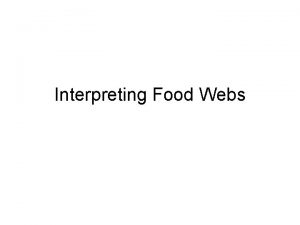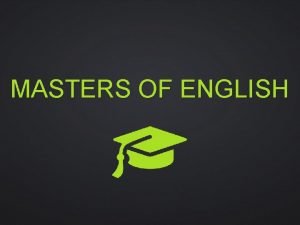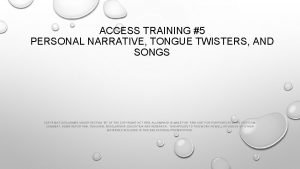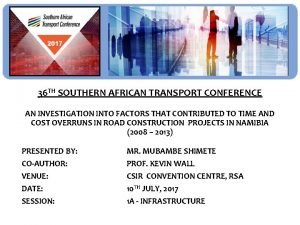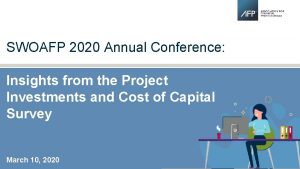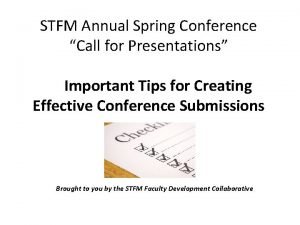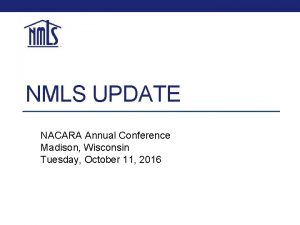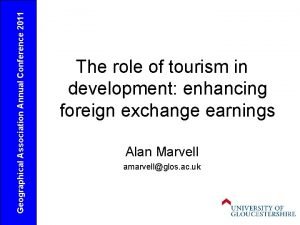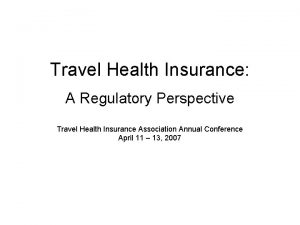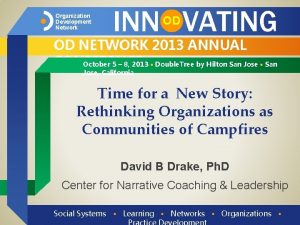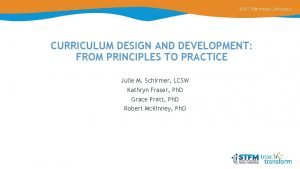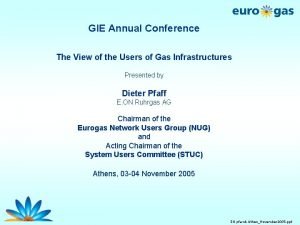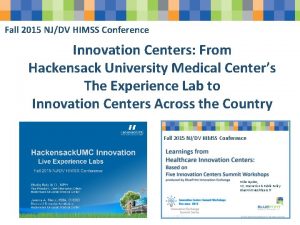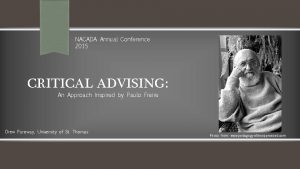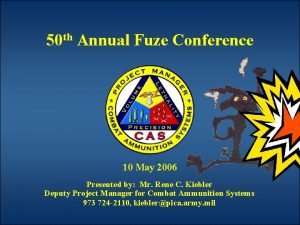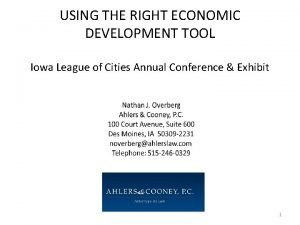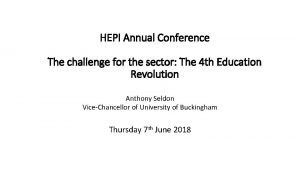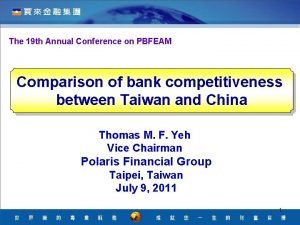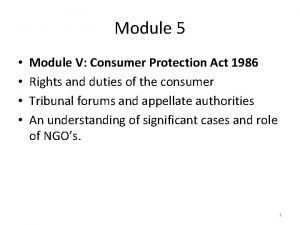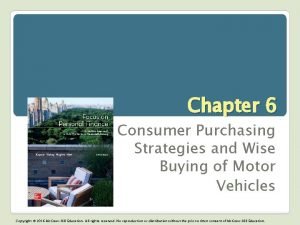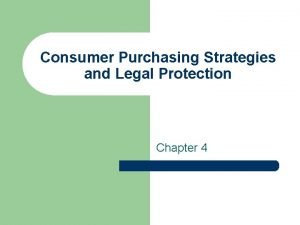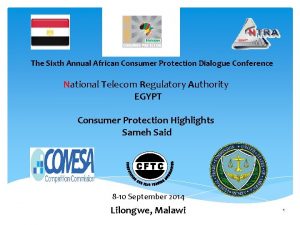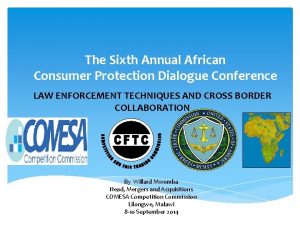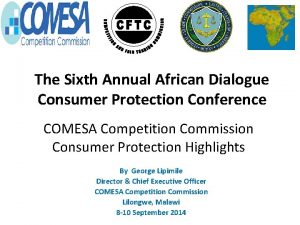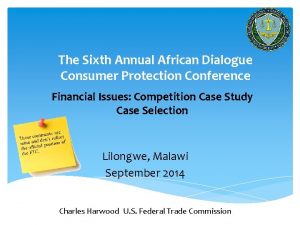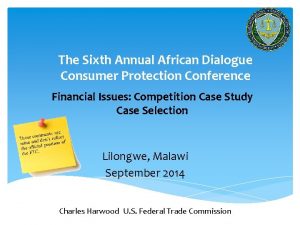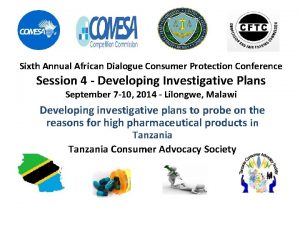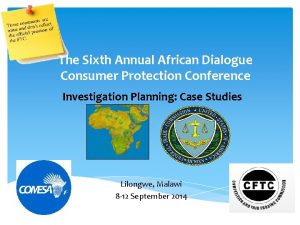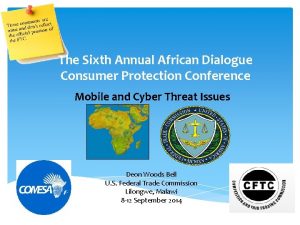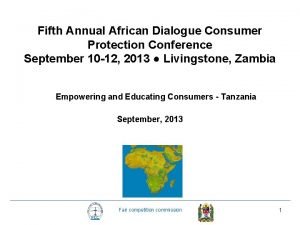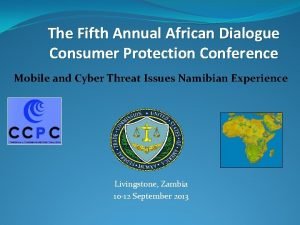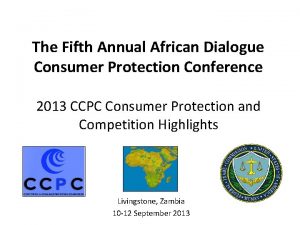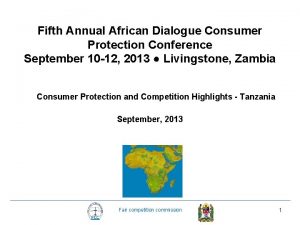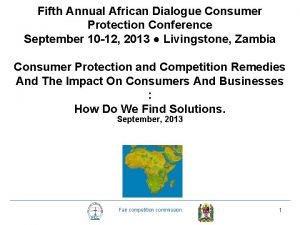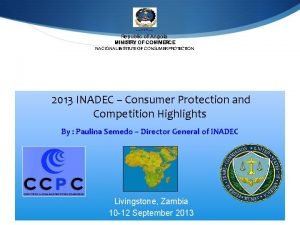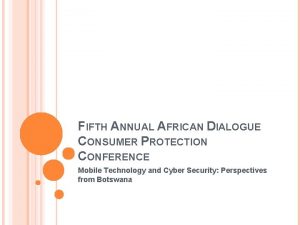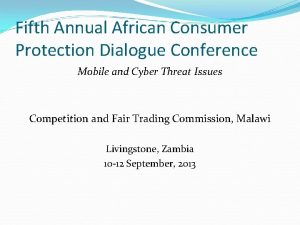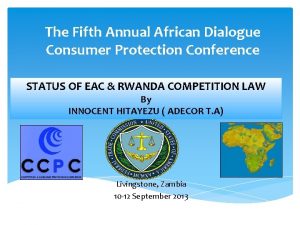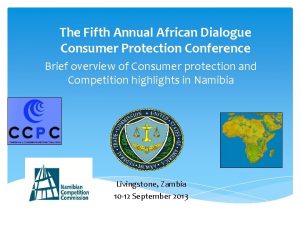The Sixth Annual African Dialogue Consumer Protection Conference






















- Slides: 22

The Sixth Annual African Dialogue Consumer Protection Conference Energy and Environmental Case Studies Deon Woods Bell U. S. Federal Trade Commission Lilongwe, Malawi 8 -12 September 2014

Environment: Bamboo-zled! Fact Pattern – 1/2 Talisa, a seamstress who lives in a village just outside of Yaounde, had heard from her husband, a civil servant, that one of the hit new fashions in the capital was fabric made from bamboo fibers. Apparently, he said, the shirts were seen as very environmentally friendly since they were just bamboo fibers woven together without any harsh chemicals or large energy-intensive processes. Also, the bamboo fibers apparently had anti-bacterial properties to help ward off diseases. Talisa set to work to create a bamboo-fabric shirt for her husband to wear to work (with the idea of later making more to sell at market). While she was easily able to find some bamboo to work with, taking out the fibers and weaving them into a yarn was a long and hard process. When she finally finished the shirt, her husband said, “Oh no! The bamboo shirts don’t feel or look anything like that! It’s way too scratchy. I don’t want it. ”

Environment: Bamboo-zled! Fact Pattern – 2/2 Traveling into the city with her husband, she came across some of these “bamboo” shirts in the market, which she quickly deduced were just another fabric known as rayon. Rayon is made from wood pulp, which can include bamboo, but it’s processed down using many dangerous chemicals such as lye and sulfuric acid into a smoother form of fabric. Even if bamboo had any health properties, they would be lost through the chemical process. Not wanting to be left out of the fashion fad, however, Talisa started buying some rayon fabric and marketed some dresses she created as “made from bamboo. ”

Environment: Bamboo-zled! Exhibit A

Environment: Bamboo-zled! Questions for Discussion What exactly was the fraud committed here? How would you go about investigating a case like this? Is it important whether your agency has received any consumer complaints? What factors would be important as your agency considers whether it will pursue this matter? If you decided to pursue this matter, what would your agency have to establish? Would it matter if the perpetrators here are not formal businesses but are individual people? Is there any other agency that may have a role, including NPO’s and selfregulatory industry body? What type of relief would you seek in this matter? What type of consumer or business education, if any, do you think would be effective?

Energy: Solar Cooker Fact Pattern – 1/2 Talisa’s cousin, who had moved to Côte d'Ivoire with her husband, was visiting and had told her all about this new solar powered cooker that they had recently bought. . . “Since it uses the sun, you don’t need to buy gas or fuel or wood or anything!” The cooker was made by a newly created company in Abidjan. When Talisa asked her cousin whether it still worked during the nighttime or when it was cloudy, she replied, “Oh, it has a superduper battery attached so that it will work anytime! It’s really not a problem. ” The area where Talisa lived soon encountered a fuel shortage, and their regular oven started to break down. She started to think more closely about giving this cooker idea a try. Her husband was wary about the idea since the cooker would have to be imported from a long ways away and might get damaged or confiscated. Eventually, she and her husband decided to give the cooker a try.

Energy: Solar Cooker Fact Pattern – 2/2 The cooker arrived in one piece. In the manual, it stated that it would provide a continuous stream of 600 W of energy if placed in the correct way with full sun exposure, which would be good enough to cook everything she needed. However, without full sun, the temperature on the cooker quickly plummeted that it barely produced enough heat to warm up a cup of water. The manual also touted the fact that “most of the cooker is biodegradable. ” The cooker was mainly made out of metal with some structural parts and cords made out of biodegradable plastic. In the manual, she eventually found the information about the warranty. However, the warranty for the product explicitly did not cover problems with the rechargeable battery.

Energy: Solar Cooker Exhibit A

Energy: Solar Cooker Discussion Questions How would you go about investigating a case like this? What are the rules in your country regarding product warranties? How would you approach the fact that the company here is based in another country? Is it important whether your agency has received any consumer complaints? What factors would be important as your agency considers whether it will pursue this matter? If you decided to pursue this matter, what would your agency have to establish? Is there any other agencies that may have a role, including NPO’s and self-regulatory industry body? What type of relief would you seek in this matter? What type of consumer or business education, if any, do you think would be effective?

Energy: Unplugging the Competition Fact Pattern It turns out that the “super-duper” style of battery normally contained in the solar cooker was banned from Cameroon by the “Energy Board”, and the kind of battery Talisa received was a cheap knock-off. The “Energy Board” has the legal authority to license and detail the energy usage and safety of products including batteries, wires, oil and gas tanks and power generators. But, all of its members are private persons, who were selected and voted on by energy, oil and gas company workers. It was thought that they would have the most expertise in assessing the safety and soundness of energy products. While powers are granted to them by law, the Energy Board is politically independent from the Cameroon government, and the Board’s decisions can only be challenged by a private court case. * Fictional Agency

Energy: Unplugging the Competition Fact Pattern When making the decision to ban the batteries, the Board had pointed to selected anecdotes where the “super-duper” batteries rarely had problems with storing too much energy to the point where they leaked harmful gas and, in at least one case, allegedly exploded. But, the Board did not conduct any official studies testing the safety of the batteries, nor did the Board contact the company who made the batteries to request records of safety tests. A note was found in the personal files of one member that was leaked to the public said that the Board should ban the batteries “to help smother this solar power industry before it starts threatening our oil money!”

Energy: Unplugging the Competition Discussion Questions How would you go about investigating a case like this? Does the fact that the agency here has some connections to the government affect your ability to pursue this potentially collusive or exclusionary behavior? Is it important whether your agency has received any complaints about collusive or exclusionary behavior? How would you balance the possible motives behind the Board’s decision (consumer safety v. personal gain) to assess whethere was any competitive harm? What factors would be important as your agency considers whether it will pursue this matter? If you decided to pursue this matter, what would your agency have to establish? What type of relief would you seek in this matter?

FTC v. Dyna-E FTC charged Dyna-E with making false and unsubstantiated claims that their paper products (dry towels) were “biodegradable” FTC’s “Green Guides” state that unqualified biodegradable claims are acceptable only if they have scientific evidence that the product will completely decompose within a reasonably short period of time under customary methods of disposal The towels typically were disposed in landfills, incinerators, or recycling facilities, where it is impossible for waste to biodegrade within a reasonably short time Dyne-E was barred from representing that its products were biodegradable unless it was true, and that they possess scientific evidence to substantiate its claims


FTC v. Pure Bamboo FTC charged four sellers of clothing and other textile products with deceptively labeling and advertising these items as made of bamboo fiber, when they are made of rayon The resolution barred Pure Bamboo from misrepresenting its products

FTC v. Pure Bamboo


FTC Green and Energy Guides



FTC v. North Carolina Board of Dentistry North Carolina Board of Dental Examiners tried to block non-dentists in the state from providing teethwhitening goods or services Ninth Circuit affirmed FTC’s determination that Dental Examiners stifled competition

Thank you! My contact information: Deon Woods Bell Office of International Affairs U. S. Federal Trade Commission 600 Pennsylvania Ave, N. W. H-494 Washington, D. C. 20580 Email: dwoodsbell@ftc. gov Telephone: +1 (202) 326 -3307
 Interpret a food chain or food web.
Interpret a food chain or food web. Peter piper picked
Peter piper picked The sixth sick sheik's sixth sheep's sick lyrics
The sixth sick sheik's sixth sheep's sick lyrics Congratulation dialogue example
Congratulation dialogue example Seamless southern africa
Seamless southern africa South african transport conference
South african transport conference Https //bit.ly2v
Https //bit.ly2v Edgar figueroa md mph
Edgar figueroa md mph Nmls annual conference 2019
Nmls annual conference 2019 Gcyf 2011 annual conference
Gcyf 2011 annual conference Travel health insurance association annual conference
Travel health insurance association annual conference Organization development network annual conference
Organization development network annual conference Stfm annual conference
Stfm annual conference Gie annual conference
Gie annual conference 2017 dvhimss annual fall conference
2017 dvhimss annual fall conference Nacada annual conference
Nacada annual conference Fuze conference 2018
Fuze conference 2018 Iowa league of cities annual conference
Iowa league of cities annual conference Hepi conference
Hepi conference Pbfeam
Pbfeam Consumer protection act, 1986 notes
Consumer protection act, 1986 notes Chapter 6 consumer purchasing and protection
Chapter 6 consumer purchasing and protection Consumer purchasing strategies and legal protection
Consumer purchasing strategies and legal protection
